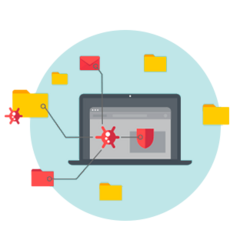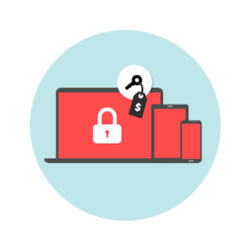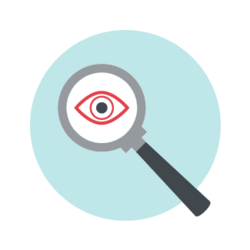These programs are developed to tackle malicious threats at all stages; they can prevent, scan and detect viruses on a computer then remove, quarantine, block or flag the potential threat.
Antivirus programs aim to identify a threat before it ends up on your computer, as well as searching for and detecting any malicious software that may already be on your device. Their primary purpose is to protect you from threats like worms, trojans, adware, malware, spam and more.
Good antivirus software, like ESET, is ever-evolving and designed to tackle both new and emerging threats to your devices, helping you stay safe in the long term.
How does antivirus software work?
Different types of antivirus software programs will vary in their methods, however they all have the same aim: to protect your devices.
Once installed, ESET antivirus software runs in the background. You set up a scan schedule and from then on, your antivirus software performs regular scans and checks on your devices to monitor your files, computer programs and web pages for any potential threats. Antivirus software detects any malicious or threatening behaviour that could be a form of malware and removes it from your device as quickly as possible, while working to prevent any future attacks.
ESET works in a completely fluid way. While it checks against existing databases of known viruses and threats, our software also uses machine learning techniques to detect, isolate and terminate new viruses, malware and attacks on your device.
Antivirus software is designed to protect users from threats such as:
Malware
Short for ‘malicious software’, malware encompasses a range of different viruses. It can steal, encrypt or delete data from your computer’s hard drive, amongst a number of other worrying things. ESET’s malware protection can detect and remove malware by running regular scans of your computer's software.
Ransomware
A prevalent form of malware which blocks access to either your entire machine, your browser or critical files until a payment is received. Ransomware often does other insidious things to your files too. Antivirus software protects against ransomware through regular backups and checks, while performing scans on all software to check for suspicious code. ESET has also developed a specific anti-ransomware solution.
Spam & Phishing
Spam is the digital version of junk mail, attempting to obtain your data, while phishing is a similar threat but uses the guise of a trusted source. Both are aiming to either install malware on your device or manipulate you into entering personal information. ESET has a number of anti-spam solutions which automatically scan and block potential spam or phishing emails.

Trojan Horses
A trojan horse is another form of computer virus. It often makes its way onto your device through spam and hides itself as legitimate software. An antivirus software, like ESET, regularly scans your files for malicious code to ensure your existing software is up to date and you’re free of trojan horses.
Adware
Adware has the potential to inundate your system with pop-ups. While this feels like it could simply be an annoyance, it can slow down your computer and also install spyware or another form of virus without you being aware. Antivirus programs are designed to identify, block, detect and remove these types of files.
Spyware
Spyware is a whole suite of macOS malware threats. Typically, they’re designed to steal your personal information, whether it’s through logging keystrokes from your keyboard, stealing passwords or important financial information.
ESET is designed to protect you and your data from all
types of cyber threats.
Isn't free antivirus software enough?
While free antivirus software can afford you a basic level of protection, it sadly isn’t enough and, in many cases, free antivirus software can actually be detrimental to your computer.
Let's start with the basics. Both macOS and Windows devices come with free, built-in malware protection. However, both of these have their limits. For macOS, the free protection offered as standard is simply aimed towards the detection and removal of basic malware and virus threats, but will only prevent you from installing the more obvious or known malware that’s currently out there.
Windows Defender is a different thing entirely. It now installs as a standard on a Windows PC and offers many users a false sense of security, leading them to believe they don't need to worry about contracting computer viruses. While Windows Defender has greatly improved over the years, it almost entirely focusses on viruses, with mixed reliability, and isn’t so effective at malware detection. This means that, amongst some of its other limitations, it won’t protect from cybersecurity issues like ransomware attacks.
Aside from the standardised protection that comes with your devices, other ‘free’ antivirus software can actually have a negative impact on your computer. Not only do many free virus detection programs not protect your computer adequately, many actually do a number of the things they claim to protect you against.
Free antivirus software risks include:
- Changing your default search engine – while that may just sound like an annoyance, this is often a way to make money through advertising.
- Install additional software – this bloatware or junkware will inundate you with pop-ups or other ‘offers’ that you are sometimes unable to opt out of. This will slow your computer down, amongst other things.
- Tracking your internet browsing habits – while this can be relatively common in software, irony comes from the fact that money is being made from a program which claims to protect your data.
Investing in antivirus programs and internet security suites doesn’t have to cost the earth, and the benefits of rapid detection of malicious files and codes across your networks significantly outweigh any drawbacks.
Why cross-device protection is important
Recent data (2020) shows that the average UK household had access to nine smart devices, and that’s only set to increase. With smart technology becoming increasingly intricate and no longer limited to mobile phones and computers, it’s now more important than ever to protect all of your internet-connected devices.
Smart devices access more data than you may realise and the more of these devices you own, the more points for a potential cyber attack you have. With cross-device protection, you’ll be able to stop phishing attacks, avoid identity theft, computer viruses and malware from a single centralised location.
In addition to cross-device antivirus software, we would also recommend using a password manager. This will assist you in setting strong passwords, which make it difficult for hackers while making it easy for you to navigate your accounts on multiple devices.

Comprehensive protection for your hardware
ESET offers award-winning antivirus proection for Windows, macOS and mobile devices. With years of experience in dealing with cyber threats, we help our users with identity theft protection and the detection and removal of malware and viruses. ESET security solutions are completely agile, and use machine learning to stay up to date with the latest malware signatures and threats.






